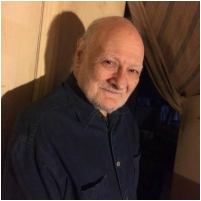 Stanley Kaplan has published poetry in a number of journals, including Onthebus, Midstream, Chiron Review, Ragazine, Mobius and Quiet Courage with others forthcoming. He lives in New York City where he paints as well as writes. He is the recipient of a Pollack- Krasner Foundation grant. His paintings can be seen on their web site, pkf.org. PRAM TO PRANK A big ado admonish. Confess you threw the confetti. You, a trobriander trudged to school. Scout, scramble, forget everything, because your potluck life ran from pram to prank. Your opera is opaque. QUINTET IN QUARTER NOTES Good and Plenty consecrated her quintet in quarter notes. The atonality quibbled with every quick shift while she shunted two parts together. Drinking port, she shoveled note upon note. Shrapnel sounds, musical tidbits discharged into the air, stunned and clattered.The harmonious clink clenched and called us home.
0 Comments
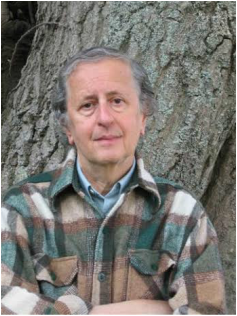 Fiction writer, poet, and playwright J. J. Steinfeld lives on Prince Edward Island, where he is patiently waiting for Godot’s arrival and a phone call from Kafka. While waiting, he has published sixteen books, including Our Hero in the Cradle of Confederation (Novel, Pottersfield Press), Disturbing Identities (Stories, Ekstasis Editions), Should the Word Hell Be Capitalized? (Stories, Gaspereau Press), Anton Chekhov Was Never in Charlottetown (Stories, Gaspereau Press), Would You Hide Me? (Stories, Gaspereau Press), An Affection for Precipices (Poetry, Serengeti Press), Misshapenness (Poetry, Ekstasis Editions), Identity Dreams and Memory Sounds (Poetry, Ekstasis Editions), and Madhouses in Heaven, Castles in Hell (Stories, Ekstasis Editions). His short stories and poems have appeared in numerous periodicals and anthologies internationally, and over forty of his one-act plays and a handful of full-length plays have been performed in Canada and the United States. Time Travel and Praying Tiring of time travel despairing of praying on a day with little wisdom yet clouds as perfectly shaped as ancient guilt and future regret a nondescript theologian ponders the perplexing differences between deterministic and nondeterminstic existence and nonexistence sense and nonsense when a sudden vision of an airbrushed Hell disrupts the pondering then the nondescript theologian rushes to an intersection strangled with tourists and shoppers crazed supplicants and childish devotees the now disrupted nondescript theologian does an awkward yet elaborate dance in front of the gathered crowd no applause, little questioning goes home crestfallen and stares into a mirror, repeatedly replaced broken too many times to count seven years times seven years times seven years or more bad luck and resumes both time travel and praying simultaneously. Pretend You Are Not Pretending a slight noise, a quiver of light, you are stopped in the street nothing remarkable nothing sinister you can readily define their uniforms are without insignias or adornment whatsoever simply freshly laundered uniforms the colour of old photographs yet you are frightened for a response is required a measurement of your life’s worth details from the last year or two of sleight of hand and artifice you fear the evaluation but silence is an even deeper denial to last another night to be allowed to walk away as if nothing had happened as if there is no distant or near past as if words can escort you to safety you concoct a life with some substance hope your breaths shimmer something memorable argue your scream has import rationalize your departure as for the best pretend you are not pretending I Intend to Dream Another Captivity The two interrogators jostled for position like two old-time comics trying to save their careers all over who would in what order ask me questions that were more circuitous than a perfect maze more convoluted than an imperfect prayer. First the one then the second screeched, You-better-answer-or-else you’ll never see your loved ones again, their threats copycat clichés. The old-time comics become shoddy B-movie actors mangling their lines, getting the accents wrong like winter weather in the middle of summer: Why are you here? Where are your papers? Who sent you? I stopped listening be they comedians or inept actors I had other images to contemplate another life to invent besides, I intend to dream another captivity this one is more tedious than even the last.  Scott likes to fly airplanes, ride motorcycles, and drive just about anything with four wheels. He's just finished reading the Eragon series and is looking forward to his next reading adventure. His latest training article on how to improve your short and soft-field takeoffs appeared in the January issue of Flight Training magazine. He's currently writing a short film inspired by a blind date. Morning Coffee Forgive me for not waking you when I left this morning I didn't know if you were still upset with me I made the coffee just the way you like it Harrisburg It's snowing here in Harrisburg It's time for me to leave Packed my dreams and happiness Left with nothing to believe I took the train to nowhere Tried but couldn't reach the clouds I wish I had a warm coat I'm a sucker for big crowds It's a cold night in Harrisburg I need my bleached brown gloves Share a coffee with a stranger And kiss the woman I love The boy's fallen to his knees I'd wake him up if I could Such perfect purple snowflakes What would you change if you could? I need a cold drink and a hot night Been snowing since the clock struck midnight Packing my bags and leaving this town I think tonight I'll put the top down Boys and Girls The young boy dreamed of girls and sports Though not always in that order After school he played basketball with friends and kissed a girl while playing pretend In class his eyes followed her close, speaking to her only when spoken to. Her black hair covered her soft, pale face. He longed to play pretend with her. He watched her from his window next door as she picked flowers with her friends. He'd shoot hoops, stripping his shirt for her attention. She never took the bait. She'd laugh and play with other boys but paid no attention to him. She'd sit in the shade of the tall oak tree that separated their yards, reading stories until dinner was made. He didn't read often, partly because he didn't want to wear glasses that pinched his nose. That and he never saw her kiss a boy that wore them. He wrote poetry in school, about love and hope. But he made the mistake of sharing it with one of his friends who told him he didn't want to know about that part of his life. On the school bus he teased her, taking her flute and pulling her hair. She slapped him and made fun of his nose. He taunted her for more. She obliged. He didn’t go to the prom. She went alone. After graduation, they never saw each other again. She married her college sweetheart and read poetry to her son. Her son didn't like to read. His glasses always pinched his nose. And he never saw the girl next door kiss a boy that wore them. A Jealous Look When I saw you look at him I was jealous and felt alone You haven't looked at me the same since we had kids He's charming and handsome but I'm witty and sweet Autumn’s Sand Slipping into the darkest hour Outrun since losing his willpower Dirt and sand was conquered last By the boy who forgot the past Autumn’s sand whistled and raced Played with ghosts that never chased Her heart was heavy for a boy His boxes emptied of their toys She wanted to inspire him Names thrown like scattered limbs She took him to the stars and back Showed him love when odds were stacked For this he gave her what she craved All his dreams forgotten saved She knew he'd play with her at last He saw the flicker in his past She showed him that when darkness falls It's because his progress stalls And when he gets back on that horse His hope and love is reinforced He feels nothing that can be felt without That's why his passion must thrash out So they played together like children do Not a care in the world to bump into  Cathy Bryant worked as a life model, civil servant and childminder before becoming a professional writer. She has won 22 literary awards, including the Bulwer-Lytton Fiction Prize and the Wergle Flomp Humor Poetry Contest, and her work has appeared in over 200 publications. Cathy's books are 'Contains Strong Language and Scenes of a Sexual Nature' and 'Look at All the Women' (poetry), 'How to Win Writing Competitions' (nonfiction) and 'Pride & Regicide - a Mary Bennet Mystery' (a novel). See her listings for cash-strapped writers at www.compsandcalls.com , updated on the first of every month. Cathy lives in Cheshire, UK. The Huge Paws of Country Fog It hunts in packs, unseen until it roars down the hillside, swallows you and kills you. Today it ate us and the car and all we could see was a fur of verge and grey before us. We did actually scream as oily paws of panther-black fog tumbled over the road, alive and young and fierce against the immovable wall of paler mist. It is unquestionably a living thing. The car inched forward, terrified, crawling - we had to speak in soothing voices, then just touch it with the whip - whimpering down Winnats Pass, glacier gorge, to the hopeful village. We knew it was there all the time, the place of safety, with kettles and lights and known roads. Muffling our minds and scratching our eyes, though, the fog does not go, not quite and its feet are not small, but huge and deadly, until the sunshine comes, if it does. 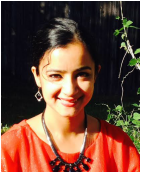 Anuja Ghimire is from Kathmandu, Nepal. She lives in Dallas, Texas with her husband and two little children and writes poetry. A Pushcart nominee, she has been published in several literary journals like Red River Review, Shot Glass Journal, Right Hand Pointing, Cyclamens and Swords. More poems can be found in her blog saffronandsymmetry.tumblr.com The Fissure There once lived two sisters Who loved each other a lot Prema was under Leela’s wings Leela was her world One stormy night, Leela asked Prema to lock the door “I did,” said Prema, without checking once more That's when something unseen had crept in That's how the wall had cracked Prema saw the fissure with the light of the dawn Right where Leela’s shadow began Every night, Prema fixed the wall It never seemed whole Leela saw through the paint, the fingerprints and all As if the storm brewed again to watch the shadow crawl Bohemian Inebriation Waxwings are crashing on the glass Headlong The fermented stench Is never a warning enough They pluck and pluck Pink stain spreads On the stuffed beaks and the fluffy cheeks Like Rorschach’s inkblot Even forests have open secrets Songbirds switch lanes sans signals They don’t sing when they’re high Sometimes, birds forget how to fly Waxwings are crashing on the trees Sideways Ethanol crosses the border The flattened heads Are never sobering enough They suck and suck Red stains spread Like shadows in the alley The berries in their beaks Are stuck 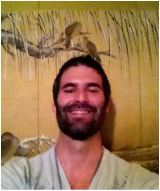 Scott Thomas Outlar hosts the site 17Numa.wordpress.com where links to his published poetry, fiction, essays, and interviews can be found. He is a Best of the Net nominee whose words have appeared recently in venues such as Eunoia Review, Your One Phone Call, Visual Verse, The Literary Nest, and Green Panda Press. Scott's chapbook "Songs of a Dissident" was released in 2015 through Transcendent Zero Press and is available on Amazon. Conversation Killer It’s a bit strange how the mind works sometimes Sitting here on the front porch when for a split second it feels as if Dad is there in the chair beside me and we’re about to discuss any old thing in the world But the sensation is gone as soon as it arrived and all that remains is the sad thought that it has been nearly two damned years at this point since the last time we talked Wind, Rain, Shiver I don’t always preach about love because I am not a charlatan I save such words for when I truly mean them Silverfish Away from the light, dancing antennae scutter past spiders to hide in the shadows where silvery scales can wait in the bathtub for the house to fall silent. Creeping and crawling while the world is asleep the pests of the night head to the bookshelf for a feast. With the dawn in the morning we are early to rise, and head to the office to wake up our minds… only to find that the words which our eyes seek to read have been devoured in full by our foul enemy… that has slipped away without a trace, leaving only torn and shredded pages in its wake – Beyond Comprehension Love is a spasmodic explosion Love is a tidal wave of passion Love is a womb bursting open Love is a scream across the void Love is an aching in the bones Love is a fire deep in the marrow Love is an agony without satiation Love is the electric pulse of skin friction Love is the tip of the tongue tasting center Love is hot flesh pressed tightly against hot flesh Love is a stain found between bedsheets Love is a wild dance in the midnight hour Love is the first sip of wine in a new day Love is the seed shooting out its first sprout Love is the dirt into which roots burrow Love is the evolutionary fervor of mutating genes Love is the unstoppable swarm of progressive adaptation Love is a widow weeping in despair Love is the sorrow of existential desolation Love is the pain of seeking perfection Love is trying again when rejection strikes Love is the thunderclap of gods in the sky Love is the rumbling storm of righteousness Love is a fat wad of cash filling up pockets Love is a space of shelter in the midst of chaos Love is the entropy that wails and gnashes Love is a tooth being cut on hardships Love is getting back up after failure Love is the new dawn rising above far horizon Love is a truth that cannot be rationalized Love is a force beyond all comprehension Love is justified violence against atrocity Love is blood, sweat, sex, cum, and tears Love is war, baby… Come and get some – 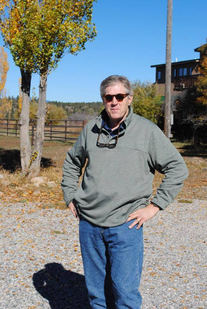 D.G. Geis divides his time between Houston and the Hill Country of Central Texas. He has an undergraduate degree in English Literature from the University of Houston and a graduate degree in philosophy from California State University. His poetry has appeared in 491 Magazine, Lost Coast, Blue Bonnet Review,The Broadkill Review, A Quiet Courage, SoftBlow International Poetry Journal, Blinders, Burningword Literary Journal, Poetry Scotland (Open Mouse), and Crosswinds, He will be featured in a forthcoming Tupelo Press chapbook anthologizing 9 New Poets and is winner of Blue Bonnet Review's Fall 2015 Poetry Contest. Tips on how to choose clothing for the deceased. Something dark is best. Perhaps a Sunday suit or formal business attire. Something you might wear for a special occasion-- like interviewing for a new job. Your new position will require a certain panache. Stiff determination and a resolute smile should make a lasting impression on your new Employer. Later, as your suit empties and you fade slowly into the woodwork, it will come to you how deep life’s roots really run-- two of which are already knocking, discreetly, at your new front door. Puppet Show This Potemkin village barely stands. Even the slightest breeze shakes its walls. Look closely and you can see the seams Where the set designer joined them together. There are no actors or extras, only half-dressed Manikins beckoning from storefront windows like Whores in Amsterdam—and, of course, standing On the sidewalk, cash in hand, their customers. Behind the curtain, standing in the wings, is Pinocchio, Nose sharpened into a pencil, palms open, moving Now to center stage, eyes on the audience, back to his Maker, waiting for the first tug of the strings that will Very shortly Move his enormous painted mouth.  Peauladd Huy was born in Phnom Penh. Her latest work, published by Connotation Press: An Online Artifact was nominated for the Sundress "Best of the Net," the Dzanc "Best of the Net," and the Pushcart Prize. And with deep gratitude to Connotation Press she’ll have a book, forthcoming soon. Water Think of a river The water is not named From every depth it runs Water is water The river is not without Its flow. Its life-- The life of a creature is in the blood When he enters the water reddens-- You are not wrong: blood is thicker than water, If permissible, blood can float a river And what remains A river are found. To Purpose Where I can be of most use? I can be the pit the rain Pools after they emptied and filled, The flood now sits over the rice plains, The great lake stars Space like eyes on the moon Tonight. The moon. The moon (What can I say?). Sometimes light I can see Flickering over the water they are watching. It returns like a missing father. Staggering Bruised night to night, in various shades of light Eaten by a monster Darkness in my nightmares. Nightmare. Nightmare And nightmaring (what to say about it): It is an eye. Opening The theatrical darkness I’ve entered, not once Was I permitted to be bored With his torture, his resourcefulness to disguise And ambush—the gnat is not always a gnat, the spider, The web, the young girl looking on the garden Of white lotuses suddenly turns bone-white Genocide, those rice fields: when will they stop This constant façade over these years Old bones, scaffolding with every intricate Part I am to them? In this blank space, this vacant dark wall Spanning a grotesque mirror and its flat face, the moon I see The children following, me not far, breathless with questions, my mother and her death Camp of mothers calling here and there: Are they there? Are they here? in the corner Back I first did not see. Are they too, they still have hidden in rice Acreages, I am to appeal for (to poetry of all)? Now dirty bits broken up and stuck together (they too don’t want A whole mirror regarding such images distorting their perfect poetry). So I’m torn once and twice (are we right Calling on the service of others To view our deaths?) Once committed; twice visited (Day and night); and three times I am real Real is real to disguise You all amongst night Trees, blooms as common as rain, flood and fog Fields, my mind (You all’s actually) in voices of petals and leaves Falling, faces cut features—a human collage Of planetary deaths: can you see One’s falling dark a million stars are shown?  Naushena is a poet, an early years teacher, a healer and a mother of three. She has been writing poems since her teens about the complexities of life and developed her passion over the years. Besides poetry, she writes essays and fiction too. Her work has appeared in Boston Literary Magazine, Mothers Always Write and is forthcoming in Mamalode. The Street Lamp Light At night had you passed by the spot Hope you could miss it not. The pole; tall, slender and old With a belly wrapped in gold. In winter serving as a lantern For travelers who to their home return. Shrouded by a sheet of mist But she would secretly peep through it. Few sat studying under the little lamp light To make their future prosperous and bright. Few burnt to death at her feet At last, they had accepted their defeat. Years passed, seasons went To give light, she was meant. Children’s play she had witnessed Not a sight had she missed. Now her body has bent low. No more does she glow But she’s happy with this even For she has become, a bird’s haven. My Shape Poem I Am old. They say, may be fifty. Nay, more. I say. My life’s a book Zealously preserved with all the events I have seen. A silent spectator, I have been of travelers, who stood under My shade in the Scorching heat when I played with the Sun, hide and seek. Who would Attempt to cast his rays upon them and I swayed to and fro, to protect them. I was A home of many birds, a quiet partner of children in their games, their favorite escondite. My long roots like the golden tresses of a woman were their swings. My coarse trunk, engraved With the names of lovers, is a testimony of their fleeting love. Here I am alone at the causeway Standing majestically, With open arms. Cut My boughs to light your Fire, if you want. After All, who can burn and Still give comfort? Here I stand unreservedly, To serve and I will, as Long as I am let by you. Last Time Last time, just last time, Embrace me, Just tell me that you are sorry. Sorry for disrespecting me, For abusing me, Tarnishing my image. With both hands, apologize Say that you should not have insulted me In front of others. Last time, confess that you did not regard me As a selfless soul Who walked along through thick and thin When others left. Who sold her possessions for you When you possessed nothing. Last time, just last time Admit that your words Pierced through my body And wounded my soul Leaving invisible marks That this self will always behold. Last time, kneel down and repent That you killed My love, my respect And my compassion for you, Only then, perhaps, I may forgive you.  Louis-Daniel Boulanger is a husband, father, professional procrastinator and extremely part-time scribe living just outside Toronto, Canada. Considering Haiku's little word puzzles he spends some insignificant time crafting his own short and sweet confections. Haiku Scribblings Ed: A collection of (mostly) absurd little haiku’s. Not to be taken seriously. no sight of nature resignation settles deep tradition no more A form-free Haiku Both lovely and most absurd A neat little gift Nose thumbing at con-vention is a most grati-fying rebellion Writing haiku's with five/seven syllable words trite, mad and sublime Vocabulary Oversimplification Irrefutable Stunning madness; the poems hold little meaning- bring joy nonetheless  John Grey is an Australian poet, US resident. Recently published in New Plains Review, Perceptions and the anthology, No Achilles with work upcoming in Big Muddy Review, Gargoyle, Coal City Review and Nebo LITTLE JOHNNY'S GOT THE BLUES It's almost midnight. It's quiet out but for an oak branch that taps upon his bedroom window. From the small radio plugged to his ear, a disc jockey, three states away, spins old southern blues records, rough and raw, whiskey-stained, aural wizardry to a white kid in the upper Midwest. His father's playing poker with his buddies. His mother's drunk on the couch. Theirs is a strung out kind of blues. Not three chords and a growl. More red faces and raised voices. Mississippi John Hurt is wailing "Spike Driver Blues." In the pain of that leather throat, a railroad's being built on the backs of poor black men. That sounds nothing like the ache from a belt across the legs... until, by the second verse, it does. BEAR COUNTRY Nightfall, I'm back from a jaunt through the land of the grizzly. Behind me, woods have turned black, mountains melted into sky. I made noise the whole way so the bears knew that I was coming. I saw one in the distance, drinking at a pond. I did not go in that direction. As much as I love nature, I'm aware that, being human bestows on me a mental superiority but not a physical one. Should one of those great creatures decide to take me on, what chance has acuity against rapacious claws, sharp teeth. I'm back at my den turn on all lights, report to the kitchen where with a cut of meat, a slice of bread, locked doors and windows, I'm returned temporarily to the top of the food chain.  My poetry has appeared in a handful of literary journals, including CrossConnect, Epicenter, RiverSedge, the South Carolina Review, the Squaw Valley Review, and the Wisconsin Review. I am the author of Wine Songs, Vinegar Verses and Spring’s Fall (Autumn Numbers, Book I). I am also an alumnus of the Community of Writers at Squaw Valley. THE MOST MISTAKEN Stan called it an accident of God-- “the Most Mistaken Revelation”—this enhanced determination to subject one’s enemies to Love, to release judgment and to forgive their trespasses as they trespass on the correct way to grasp and to love. “The Eleventh Commandment. It’s perverse. A one doesn’t fit inside a one,” Stan contended as he stripped down and strapped on his vest of many favors: bulletproof, fireproof, and a flotation device. It covered an array. But it couldn’t delay the inevitable. “Past time to put what’s right right. Even the odd.” And thus Stan began his war with and for his God, saving Him, correcting Him, by sacrificing himself as he set out for his job, maintaining the water park, at dawn on the day devoted to Pride. WHAT MORE IS THERE TO SAY? It could not be worse than when he answered “Favorite fictional character?” with “Myself,” later adding “God,” and “Satan”—an odd conflation of artistic cons, some called it. The Artist who purposely limits potential influences simply to achieve a pure and surely limited audience may get a side effect for his cause: apple-saucy applause, rustling leaves. So many years without one date can force one’s mind to feed on more than memories when making queries of history, carried and left to be parried by future myth-makers tracking their way back to ruin, then (maybe) reinvent. “The only fact to leave those not yet born is a warning: ‘The greatest trick Love, hustling, might play is to make would-be lovers believe It doesn’t exist, save as a joke, a gas, the ghost of a pact between deities who divorced on an orchard’s stage.’ “Can you imagine a situation where the population regards Love as nothing more than a minor character in a fantasy?” TO BREAK A WORLD Mary, mirror your lover’s error; pass the lipless kiss, Word without letters, to flow, sowing waves—no sound, dry witness, no bounds-- Imagine the blue mute Singer, her green seeds growing a dirty ditty in all willing and open to cut the immaculate but immaterial cords.  Stephen Regan’s poems have appeared in: Envoi; Killing the Angel, Provo Canyon Review, Reach Poetry, and the Best of Manchester Poets anthology. His poem ‘Red-bricked’ is part of a permanent art exhibition at Wigan Wallgate railway station in Lancashire. He’s the founder of the Liver Bards poetry group in Liverpool. Glossy thing Bright and earnest He comes to the stand proud of his leaflet; invites us to admire the glossy thing, strategically folded. It outlines a ‘radical new service delivery, now gaining support’. Can’t speak for the rest but I’m not impressed and my face shows it. I shouldn’t be here among these PR tarts. I shouldn’t work in PR; can’t admire on request; can’t get excited about leaflets – or PowerPoint. My authentic distain is out of place among the stretchers of truth and reality. Wan smiles flash around as the leaflet passes its test. The bright and earnest one insists his glossy will ‘revolutionise the way we do things going forward’. I don’t want to go forward. I don’t want to be here. Give, smile, lie Go and give that man some money, commanded Mum, pointing across the way to a beggar. We’d been watching him while on a fag break from our Mothering Sunday lunch in Manchester. I’d taken Mum to the expensive restaurant. She spotted the ragged man and felt compassion. She can barely walk, so asked me to cross the street and give alms to he sat on the pavement, smoking. I fumbled for two quid, handed it over. There was a pause. I passed him a cigarette and proffered my hand. He took the fag, tucked it behind his ear. We shook hands, fairly normally, then he stared up at me – harshly. I must have seemed distracted to him. Well, I was distracted and confused for most of that year. The man said, Look me in the eye if you shake my hand. That shocked me. I clasped his palm again, made eye contact. I’m always prepared to look someone in the eye, I said. I walked back to Mum. She said, thanks love. What did he say to you, that man? I looked at Mum, not quite in the eye. I told her, he just said thanks for the money. She smiled at my lie. Mothers know how to smile at lies. They get much practice. Revolution, Arguably It was from the beginning uncomfortable being human; being the beings between the angels and the beasts. We factored in gods and moral law, emanating from the ineffable, interpreted by the f-able. Make that work and survive! We did, with big casualties and many paradoxes, including this … to achieve peace and justice, lasting long enough to be worth the effort, we sometimes had to go to war. Glad I mentioned justice. It’s arguably more important than equality in these revolutionary times, as in earlier ones. Try to enforce equality among humans and de facto you impose injustice. Ask the libertarian socialists about that. They’ll have many opinions and arguments about it. And look back; it’s always wise to do so, even for revolutionaries. We’ve survived so far under strong chieftains and /or ethically-justified laws. In the West it worked like this, theoretically; we lived and died in freedom, under the law, within nations. I know, I know! We need to change the paradigm and the power dime. In the Year of Our Lord 2016 we can’t go on like this. Oh God! I’ve mentioned Our Lord. Well, I can’t help it; once a Catholic and all that, and besides … revolutionaries are in favour now, and Jesus was one, and much more, arguably, regarding the destiny of humanity. In this revolutionary era ‘arguably’ will be often said. There will be no consensus. Cilmate crises, capitalism, military suppression, twisted faiths, widespread worship of the self, and Evil emboldened to promenade – it’s all in the mix with clamorous expression of support for revolutionary impulses, given by ‘The People’ digitally – intemperate, hate-filled and stupid most of it, as you expect from social media. Where will the revolutions lead to? A new dawn? Apocalypse? Rescue by intelligent extraterrestrials? It’s hard to judge but doubtless the arguments will continue. The dynamic of my love Thought of her, smell of her, sight of her, rooted for life. Seeing her eye, all that’s human in me down from vision to throat, down, down, flooding. Her always, moving in me, is me. All I am, her. 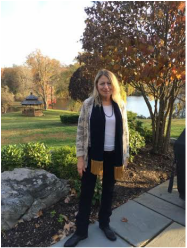 Thea Schiller, a Long Islander from New York, holds a B.A. in Creative Writing from The City University of New York, and an MS in counseling from Western Connecticut State University. For over two decades she spent her summers abroad in France with her late husband and daughter. She is the Orchard Prize winner for her poem, "Sarah" published in Furrow, University of Wisconsin, and has been published in other University literary presses. Currently, she lives in Westchester, practices psychotherapy in Connecticut and is writing her first novel. Eternal Snowfall Sartre said, There is “No Exit.” Two morning doves defy winter. The son turns East on the icy branch and prays. The mother bird puffs up her beige chest one last time; God’s flakes fall full and translucent. Crystal diamonds open up the promise of world Beyond isolation into memory. Hope expands past personal stores into Kingdom, Beyond Sartre and literature To find entrance.  Christina Murphy’s poetry is an exploration of consciousness as subjective experience, and her poems appear in numerous journals and anthologies, including, PANK, Dali’s Lovechild, and Hermeneutic Chaos Literary Journal, and the anthologies From the Roaring Deep: A Devotional in Honor of Poseidon and the Spirits of the Sea, The Great Gatsby Anthology, Let the Sea Find Its Edges, and Remaking Moby-Dick. Her work has been nominated multiples times for the Pushcart Prize and for the Best of the Net anthology. Before There Were Rebels Before there were rebels, there were prodigals; before there were prodigals, there were fathers; before there were fathers, there was God. Perhaps. Or maybe God was a conventionalist, not a prodigal, or a rebel, and only peripherally a father. Deciphering is the key because there is no way to know. So the mind plays with logic and the heart plays with need, and any of the three will work depending upon how it is one needs to see or understand stability or chaos. God the conventionalist would have created out of duty God the rebel would have created out of spite God the prodigal would have created to re-create a lost unity Seeing God as the conventionalist, it is easy to praise God’s work ethic. A lot was accomplished—beyond perhaps even God’s expectations Seeing God as the rebel gives one sympathy for those who feel angry at being in someone else’s world on someone else’s terms Seeing God as the prodigal makes one aware of transgressions and the desire to make amends by replacing a broken trust with a new world of second chances Seeing God as God lacks the human touch, which might be fine with God, but is too limiting for humans, who might wish to think of God as one of their own So perhaps God was none of these but just a child seeking to play in a world of no playmates, in a vast darkness before the Let there be light And God the child was a visionary, and the ideas became visions, which became the three-dimensional forms that humans came to know as reality Ah, the prodigal plays, the rebel fantasizes, and God the child mourns for companionship equal to God the child’s abilities and interests And everywhere, the Universe mourns for lack a North-Star God who is centered within the darkness and defined by light The world is a dream of perfection that falls from grace in every pensive moment of a human or God-like heart Rebel on, oh God, while prodigals you have created look for the way home in the bittersweet melancholy of stepping stones into stillness Yuxing Xia is an author and poet who has been published in 10 different countries in journals and magazines such as Society of Classical Poets, Strong Verse, and many others. He hopes to retire to an ostrich farm. Rain Within the crest of a lasting rain, I held an umbrella hostage for a friend. I stood wide-eyed for several hours, waiting for a shadowy figure to emerge and greet me with a sigh of relief. I wondered if I (or my friend?) was at the wrong spot and we wasted time waiting for each other to reach the other, only to find ourselves lost inside the labyrinthine self. Backseat Take a spin around the block and let me know if you like the new car because it’s your birthday and I wanted to give you that pickup truck. Run through some mud and a few mail boxes, go opposite the one-way lanes and I will follow the trail of twigs and leftover paint to your home. As I savor this moment in the back seat, we will make new memories along the highways and floating dust, speeding under the cover of moonlight and bumper stickers. The moments we sacrifice along the journey of increasing velocity will not be lost once the brakes break. Colony Legions of time couldn’t fall when we crossed the colored seas, sailing with a creaky boat. Our heads were raised above the mast with salty air swelling our faces. We could twist that old raft in whichever direction we wanted jumping up and down. And the wear in the rudder was telling of our clumsiness. We knew the first sliver of land was going to be cooked and eaten, then stepped on and colonized. 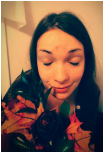 Deborah Rocheleau is an English major, Chinese minor, and all-around language fanatic. Her writing has been published by Tin House, 100 Word Story, Flights, and Thema, among others. She is currently writing her third contemporary young adult novel. Lightning Strikes Waiting for the elevator to the Washington Monument our tour guide informed us the structure is free-standing No mortar holds all those marble blocks in place but their weight alone anchors them to the Earth. No nails were used an architectural trait it shares with the Japanese pagoda made not with stones like their Chinese equivalents, but wood, paper, earthen tiles and a heavy central mast, the shinbashira that keeps the building upright through an earthquake weathering a natural disaster better than the Washington Monument. The day after our trip up the Monument, an earthquake rattled the Capitol sending a crack down through the free-standing stones of the obelisk like the mark from a bolt of lightning when it kisses the top of a stripped, branchless, cypress tree. Although pagodas withstand the earthquakes inevitable in Japan random lightning strikes are claiming them one shinbashira at a time. 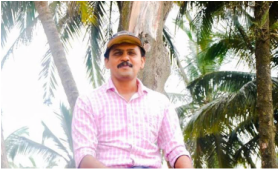 Fabiyas M V is a writer from Orumanayur village in Kerala, India. He is the author of Moonlight and Solitude. His fiction and poems have appeared in Westerly, Forward Poetry, Literary The Hatchet, Rathalla Review, Off the Coast, Structo, and in several anthologies. He won many international accolades including the Poetry Soup International Award, USA , the RSPCA Pet Poetry Prize, UK, and Merseyside at War Poetry Award from Liverpool John Moores University, UK. His poems have been broadcast on the All India Radio. The Lunatic Holy Man Hole in the ozone layer of his sense increases. He mutters to the tomb of his father, while clumsy expressions flash on his face. A hundred fools watch him with awe. It’s paradoxical they chant holy verses. He has a big sedimentary belly formed from offerings. He heals the insane, rustics say, patting on their crests or tying black cords around their waists. There’s a panacea for peace for many in his absurd mantras. He became a holy man after his dad’s death with the privilege of birth. Lunacy adds charm to his character. Fame’s sometimes a friend to folly. Even the distant mother comes with her daughter for a cure. There’s a relief in belief. Endosulfan Rain It wasn’t monsoon but toxic rain. Diya drenched in the doldrums. Her head bloated, brain turned barren. Her body curved as a cashew nut. Her legs and arms dried. Aches and anxieties grow up in the cashew farm. Sad sap oozes out of her mouth. Her doll lies dead. Now she isn’t a girl but a remnant on an empty mat. (Endosulfan is a deadly insecticide.)  James Croal Jackson lives in Columbus, Ohio. He spent a few years in Los Angeles working in the film industry, but now he releases electronic rap albums under the pseudonym 'Layzerus'. You can find some of his poems at jimjakk.com. Again For two weeks I bathed deep in the sweat of whiskey. Submerged vocals yawed to 3am caresses together, together. The silken bed turns itself over, its base an earthquake. Listerine breath hurls to vortex the two years of refraining from the holy riptide– how its arms reach and withdraw, reach and withdraw. You would drown in the salt of married shells, sheathe your crackled forearm in the tide's tattoo. You would let it embrace and clear your pearls. Thus begins the tide anew. The Photograph Was a Drunken Winter slackened falls into chaos: each plod a sobering imprint on snow buzzing cavernous hearts white honey swathes the air the dewdrop pale of her shirt, arms curved from the door in bent-seven candles, icicled waxen breath hissing this is the moment sculptured to ice: a future with gluey trees barren at night, tongues born licking telephone poles static moments stretched to angel hair feel like rare dreams caught in dim light Night Chill in the vacant living room our packed boxes never touched, black mold assumes the ceiling fan. it awakens every morning wanting to spin, to slice into the air with its fine blades a surgery of breathing and the chest waits for your steady palm to resuscitate those numb nights, when our billowed heat cooled our voluminous bits Arrival We were the hardwood floor. Cold squeaks, outstretched panther palm, red hand, expected the chlorine. Wax splashed baby oil eyes and it is citrus– cinnamon, acidic. Where we were wanted, the pitchfork path and jagged rim, this fungus crust metastasis, you twirl and twirl your index finger until it leaves. Pretzel we bend and fold to keep some memories alive we with our doughy cores– salty to the lick– rose and contracted, twisted into rope, into ebb and echo, ripples of the faintest caress, fingers forever indented on the crust Elizabeth S. Wolf lives in MA with her daughter and several pets, where she maintains a day job as a Technical Metadata Librarian. Elizabeth has previously published poems in local anthologies (Merrimac Mic: Gleanings from the First Year; 30 Poems in November 2014; Amherst Storybook Project). The Amherst Storybook Project is published in print and on YouTube: https://www.youtube.com/watch?v=z6d3pUd8jR0 Grateful for Good Neighbors for Tom and Marge Crosby Thank you, kind sir. You saw something not right- a child? a doll?- tossed awkwardly in a pile of leaves. But what’s important is this: you stopped. You went back. Out of your way, late for work, you listened to that little voice- something is not right- and you found a small girl. A toddler, naked and weary, burned and bruised- tortured- alone- in that pile of wet leaves. And you and your wife, you gathered that child up, in your arms, in your coat, and you brought that baby home. Thank you. In a crazy mad world we are told to look for the helpers. And you, you and your wife, on that morning, by that act, you saved a small girl, and also a shred of my soul. ** This poem was inspired by a local news story: http://www.boston.com/news/local/2015/11/23/the-parents-the-kidnapped-hamilton-girl-are-thanking-those-who-helped-find-her/7kwB5yeLKsL0fnEX2VC48N/story.html The Inside Scoop If I decide to tell you what I see, would you love me still? Trapped tumbling inside are my comrades from the madhouse: the woman who swore invisible poodles pooped on the rugs. She swore, in her pink tattered robe, ragged fringes framing her face; she stared from under chunks of eye liner, stale streaks of blue eye shadow, stared and saw poodles by the the country club pool, where her soon- to- be ex- husband and her ex- nanny lay stretched beside her children, the babies she had born, panting and pushing and crowning, children who feared her now, who lay safely outside, in the sun. Here in the hallways a skeleton is staring, drugged eyes sunk in bony sockets; he tried to starve himself, wasted away to nearly nothing; now he munches rye toast, walking slowly on skinny white legs, leaving a trail of dry crumbs; walks passed the jew who decided one night that he was the true jesus, who walked out barefoot through the snow, proclaiming his message and all that was divine; who was carried in raving and now sits rocking, rocking, rocking, cradling feet swathed in white bandages, covering blackened frostbitten skin, nearly lost toes; he believes the doctors from the ER drained all of his powers, all of his divine love; he seeks his debrided skin as if the shredded scales are holy, as if he could still be saved. Salvation. Lo I have seen the writing on the wall, heard the silent scream, lunched with the hollow men, the stuffed men. So will you, won’t you, will you, won’t you, come and join the dance? Just this morning I noticed the door was ajar. ** The opening line of this poem was inspired by "If I were to tell you what I see, would you love me still?" from: A Case Against Old Habits, Janet Longe Sadler, Amherst Writers and Artists Press Sorrowing Back and forth, back and forth. Oh how I love to go up in a swing, up in the sky so blue. Three years old, three years old. Yesterday he was laughing laughing laughing at the little dog with an upturned tail. Mummy we can see where he goes poopie! Back and forth, back and forth. Oh how I love to go up in a swing, up in the sky so blue. Mummy mummy mummy I can’t breathe. The wheeze, the cough, the wide terrified eyes, lips turning blue. Mummy mummy mummy where my medicine? Back and forth, back and forth. Oh how I love to go up in a swing, up in the sky so blue. To the park! His very favorite place. Over there we look for dandelions, we puff and blow off all the fluff. Here in summer, the sprinkler comes on. Look at me, mummy. Look at me! Look! There’s where he toddled at two, chasing bubbles, on stubby chubby legs. Here’s where he fell on his pampered butt, looking so surprised. Back and forth, back and forth. Oh how I love to go up in a swing, up in the sky so blue. Yesterday she looked everywhere, everywhere, couch cushions flying, bathroom cabinets flung open, drawers overturned. Where is the inhaler. Where is the epi pen. Mother of God, where is your Child: please let my baby breathe. Back and forth, back and forth. Oh how I love to go up in a swing, up in the sky so blue. She dressed him in his Blue’s Clues shirt. She dressed him in his red red shorts. She carried him down to his favorite park to the swing he used as a baby; the swing with a seatbelt to hold him in. Back and forth. She sang. She prayed. When the sun went down, she recited Goodnight Moon: In the great green room was a telephone, and a red balloon… Back and forth. He is not giggling. Back and forth. He is not pumping his sturdy legs; back and forth not tossing his shoes into the grass; back and forth he is not breathing back and forth Mummy’s best boy back and forth keeping in rhythm back and forth just the two of us back and forth up and down Mummy and son forever and ever, amen. Dawn came. The coffee truck opened for business. The police came. The neighbors watched from a few feet away. The baby left on a stretcher, the sheet pulled up over his head. The momma went in another car to a different place. Somewhere nobody ever wanted to go. Goodnight moon. Goodnight air. Goodnight noises everywhere. Goodnight baby. Mummy loves you now and forever, my little angel. Amen. ** Sorrowing was inspired by a story in the Washington Post in May 2015. The events in the poem are completely fictional; I have not followed the continuing story in the news. https://www.washingtonpost.com/local/mother-found-pushing-dead-three-year-old-on-a-swing-in-md-park/2015/05/22/b2acd6fe-00b6-11e5-805c-c3f407e5a9e9_story.html Germanwings 9525 24 March 2015 It was a mild mid- morning in March when the plane, after a short delay, took off from Barcelona. There were 56 empty seats; there were 144 passengers on board; there were 6 crew members. There were no survivors. There were 16 German high school students heading home that Tuesday. Sixteen lives on the cusp, aborted. The girl in row 16 sobbed, wished she had kissed that boy who stared at her, wished she had hugged her mother and not turned away, not refused to let her mother help pack and carry her bag. Iche liebe meine mutter, she says, over and over, her stomach in her ears, her ears throbbing, now she is screaming, I love my mother. The pilot knocks at the locked cockpit door. The copilot breathes steadily in silence. The baby in row 11 wails. His ears hurt, thinks the mama. She starts to shush and rock her child. The papa points out the window with a shaking hand. Look. Now the mama rocks and prays, singing the lullaby her mama sang to her: Sleep, baby, sleep. Sleep, baby, sleep. She calls on all of the angels of God to spare her only child. If this impossible thing is happening maybe a miracle is possible too. The businessman in seat 3A gives up doodling on his expense report and cries for the child that he won’t see grow up; for the wife he won’t kiss again; for ever leaving home for a stupid business trip. The businessman thanks God for life insurance, hopes that his wife never finds those pictures tucked up and zipped into his briefcase pocket: Please, God, spare her that. And mama, meine gelibte mutter, I love you. The pilot backs up, lunges at the unrelenting door. The copilot breathes steadily in silence. The retired grandma in row 22 closes her eyes thanks heaven for this last week with the children and their children, precious kindele; she wings a prayer to her best friend through all these last long years; remembers being fond of her husband, and prepares to meet him and her blessed mother when the plane plunges into the blanket of snow spread over the rugged mountains. The bass baritone in row 9, whose honeyed low notes resonated with dramatic emotion, is reduced to sobbing and calling out for Ave Maria, Mother of God. The pilot shouts orders and codes, thrashing at the door. The copilot breathes steadily in silence. The stewardesses hug each other. They know crash position won’t do a damn thing. They think of the hours spent trying to identify the enemy in the crowd while all along evil was standing beside them, in uniform. And this is how it will end. The high school boy in row 17 is sorry that insisting on sex ever made Annika cry; hopes his father remembers how proud he was when he made that basket at the buzzer, and when he stood up to those jerks at the park, even though the kid they were picking on really was a dork. The pilot steadies himself pictures his mother, young and tender and sleepy, tucking him back into bed. He apologizes for his hubris. The pilot, bellowing, tries to overthrow fate but he can’t. The baby in row 33 puts her hands to her ears and shrieks. Her mama screams too, counting her rosaries on baby’s flexed toes, begging forgiveness for minor forgettable sins. The copilot, breathing steadily in silence, disables all alarms overrides auto-corrections and recalibrates his deliberate descent. The American mother and daughter in row 27 clutch hands as the earth hurtles closer; the mother closes her eyes, refuses to believe; the daughter screams “What is happening?” over and over, as if translating into a different language could change the certain course. The unthinkable happens: the plane crashes in flames. For days the crews search at the Ravin de Rose´, melted snow refrozen around chunks of char and melted metal. They find scattered teeth and bones. They report headaches, some nausea, some shortness of breath. Possibly high altitude sickness; the plane hit the mountain at 5,000 feet. Possibly the sudden release of 150 souls returned to stardust and ash. At night the inspector from the local village goes home, scrubs away the grit and warms his hands; climbs into bed giving thanks for his home and family, for the mother who loved him and the father who raised him to be the kind of man who walks into the wreckage of hell and tries to mend it, or at least comprehend. He prays for a dreamless sleep, but awakens again and again to the phantom cries of the anguished pilot banging on the cockpit door. The reporter on the spot once so jaded and cynical always good for another round of drinks sets aside his cell phone ceasing to follow and retweet; turns off the TV with captions the radio with constant commentary, and closing his tired eyes, thinks back to the last time he told his mother he loved her; the last time he saluted his father, lost in old stories of a forgotten, predictable war. The reporter is haunted by the madness of the copilot breathing steadily, in silence, for the 10 long minutes he dove towards destruction. The restless reporter feels his lips moving in prayer for the eternal salvation of the pilot blocked by the locked cockpit door. ** This poem was inspired by the widely reported actual crash in March 2015. The occupations and ages of the passengers, type of plane, site of the crash, and actions of the pilot and copilot are taken from news stories or twitter. The thoughts of the passengers and crew are solely fiction.  Marie Kilroy has recently been published in Allegro Poetry Magazine, Loveliest Magazine and the Lummox Press. She graduated from the University of Mary Washington with a B.A. in English and lives in New York City. Desert Seeds “…things and animals – and our enjoyment of it is so indescribably beautiful and rich only because it is full of inherited memories of the engendering and birthing of millions. In one creative thought a thousand forgotten nights of love come to life again and fill it with majesty and exaltation.” – Rilke I lie flat against the flat Mexican plateau. The cacti’s silhouettes stand silently in the sunset like soldiers, arms raised skyward. In the early evening the stars flood in like girls in Quinceañera gowns, grasshopper salt on their shiny lips, and they float above on the sky’s dance floor as the volcano with its icy hat puffs his pipe to greet them. Rilke believed in a future poet who comes to say the ecstasies that are unsayable. I believe him and the owl uttering words I cannot repeat. The black witch moth’s seven inch wingspan sets in motion a fire on the coast. Small animal skeletons litter the sand like diamonds on a rich woman’s arm. We are all birthing all the time. I vow to love it all, even the solitude. I can see the seeds alight in the wind, birds to new births, the world over in majesty and exaltation. City Swan In the late evening in Central Park lies the edge of the lake-- glowing in the little light from the moon lies the swan, from song to silence and stuck in the little laps of water against earth, beak tucked in a U as if she was trying to un-see, to look around the still-rooted trees in their black gowns like willows at a funeral mystical, ethereal in gossamer nightshade the feathers still satin, the wings unfolded, leaving her round body exposed, her tiny feet in mud – O, mythological Swan; O regal Swan—felled, felled-- A homeless man laughs at the sight—“That’s what’s next!!” and pees into the grass, stance askance the vinegar smell, a fog smoking upwards in the branches-- her body hardening against the soft waves.  Ananya S Guha lives in Shillong in North East India. He has has been writing and publishing poetry for the last thirty years. He has seven volumes of poetry to his credit and his poetry has been widely anthologized. He has been published in Gloom Cupboard, Art Arena, Other Voices Poetry, Glasgow Review, Osprey Journal, New Welsh Review, Dead Snakes, Dissident Voice, Poetry Life 7 Times, WritingRaw among many others on line journals and print magazines/ journals in India & abroad. He holds a doctoral degree on the novels of William Golding. In March... In March when dry winds arrive, and the stooping woman still continues to sell last vestiges of her fruits to the haggling, irate buyer whose bitter mouth would savour that one last taste, touch- when school children will shed off inertia and behave like this irksome wind, I will sit by the window and dream of poetry in hour glass in a transparent house of books, words, shelves with a dancing elf, and the wind's legerdemain hoisting boisterousness to write a poem, with these emerald shaped hills, standing in vastness of monoliths. History unceasing, high priests calling; the dahlias fading, and streams bursting into seams of violet hues. The winds will whisper of evenings and encrypted souls who lived in this hill town traversing history like gladiators in a war of hope. I will go to the monoliths again to see their ancient inscriptions while those sacred groves remain in muted silence, horizons of distant skies.  Robert Knox is a creative writer, a freelance journalist for the Boston Globe, a blogger on nature, books and other subjects, and a rabid gardener, who makes his home in Quincy, Massachusetts. A graduate of Yale (B.A.) and Boston University (M.A. in English literature), he is a former college teacher and newspaper editor, whose stories, poems, and creative nonfiction have appeared in numerous publications. His poems have recently appeared in Verse-Virtual, Guide to Kulchur Creative Journal, The Poetry Superhighway, Bombay Review, Earl of Plaid, Rain, Party & Disaster Society and Semaphore Journal. He serves as a contributing writer for Verse-Virtual, an online poetry journal. A collection of his poems, titled "Gardeners Do It With Their Hands Dirty," will be published this year by Coda Crab Books. The Alligator's Approach to the Birds It is not for everyone, this Paradise of Birds The wingless ones who stand beneath the shade-cover on the boardwalk pavilion are given leave to watch, a dozen brown and watery feet away, the color of old trees glimpsed in a window's reflections, bits of shell and water-eaten leafage at the base We'll get no closer The birds know how to measure distance -- and ability, we have no wings to fly -- They land on a dime, on a dollar-sized island We stand on ceremony, the gnawing anxiety of wet feet, as if water itself were toxic We are lingering glances and superannuated vigilance But eyes cannot hurt them We pose no threat to the Paradise of Birds Who brings the stork's babies? We question one another A head like the curve of an umbrella handle turned upside down, The wood stork is patterned silk on top, yards of plump white plumage below Its young both indescribable and hard to glimpse Not half-brown like the Anhinga, whose adolescents are caramel feathered and bear allegiance to a race of beige and mustard-colored snake people and live below the waters now in a world we cannot see We satisfy our craving for vision with the Paradise of Birds Birds, we know, are merely people in a different dress (though cannot the same be said of trees?) They too enjoy a fine March day in the face of a smiling sun, fish a-plenty (where we live no such days exist) They toy with the furniture inside their nests, adjust the framing, smooth the slipcovers, content to ignore the squawks of the babes demanding to be fed They are beyond such needs in weather like this -- pellucid, clear as glass, free of insects and parasites, holding wings high to dry in the sun like Washing Day in some earlier century (though without the elbow grease) all pleasure, no work They are nature's machines for turning air and water into the grace of flight that miracle of which we are always bereft, banned forever from the Paradise of Birds The herons, winged heroes, glitter-glide besides the humans, aging creatures who crave to worship in the glow of their beauty Who will fly only when they leave this heavier career behind one final time, seeking in immaterial flight some greater good (seeking entrance then to the Paradise of Birds) Who now fly only eyes closed, limbs inert in the phantasms of the liberated chambers of the brain, those rooms they cannot decorate or conform to will Who soar only in their minds, their mind's eye of stimulus and love Who gaze with longing, and wonder at the Paradise of Birds 2. Only one beast disturbs the Paradise of Birds It syncopates the water in brownish segments a disturbance in the watercolor as if old paint got up to walk It motors in silence, like appetite or time, or the silent renewal of solid earth beneath your feet Arrives like surprise Like thought made visible, an idea given shape Like Hegel's notion of history a submerged and troubled mass forming for revolt Yet though subtle as a reptile its metrics are known by those clear-eyed cousins roosting in the bare tops of the cypress trees, mere skeletal frames and furniture for the Paradise of Birds And when the stick-legged guardians of heaven, their rapiers in their faces, their light and parried weaponry tied snuggly to their brains espy the ancient enemy They hoot their worries, in airy segmentation, a ceaseless one-two-three, warning all of the creature's trespass, the reptile in the sally garden waters of the Paradise of Birds 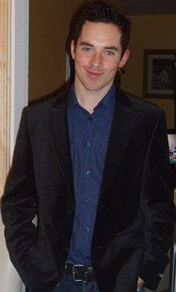 Neil Slevin is a 26 year-old writer from Co. Leitrim, Ireland. A former English teacher in the U.K., having graduated with a B.Sc. in Physical Education with English from the University of Limerick in 2011, he has returned to university to complete an M.A. in Writing at N.U.I. Galway and to pursue a writing-based career. His work has been published by The Galway Review and various American journals. When My Colours Run… The stars are not wanted now: put out every one; Pack up the moon and dismantle the sun. W.H. Auden Learned old men tell the story of Cathay’s emperor, a man who avoided the future like the plague; who, in his divine wisdom – and facing death – forbade his people from using the future tense, because without him they could have no future. And they muse about time and how we tell it, highlighting that before Christ we had no such thing, and that after His birth we had options… Did you ever make that mistake at school (you know the one), believing that if B.C. stood for ‘Before Christ’, then surely A.D. meant ‘After Death’? And later, did you read of Macbeth’s raging against tomorrow, of Othello’s beseeching kind-hearted words written in hindsight-parted letters? Wiser now, I wonder if old Cathay and Christ, Macbeth and Othello were one and the same, perhaps not in face or nature, but in outlook: all believing that Time would wait for them to find their way back from the ether, as if men could forbid the wind from breath and stars from smile, their fellow man from a life of dreams and death, while they packed up the moon and dismantled the Sun. And I wonder who will care when my life-clock stops ticking, whose day will speed up and whose night will slow down… Who will remember me not as I was – but as I am and always will be – when my dreams die and my colours run? Unforgettable Fire “Have you ever tried to remember something that you’ve never remembered before?” his face asked curling into a mischievous grin, like a magician’s goatee laughing at its master’s double chin. Incredulous I thought he was joking, but soon realised he was not; he wanted me to summon something I couldn’t remember – something that I’d a long time ago forgot’… So with my mind unleashed (like the good Catholic boy that I am), I looked away from him into the distance, in hot pursuit of the bait thrown from his hand; I wandered off, all alone in my dark, scratching at the lower backdoors of unvisited memoirs, resisting the soul-consuming urge to bark. Before pawing at the contents of my mind’s toilet-bowl mixture, as around they swirled, all refusing to unfurl, and resorting to gnawing at my still-beating heart. Up all night I played with the frayed edges of images long before torn apart, chasing the cars speeding away from me with far too much of a head start. All this before, finally, I stopped, exhausted, and slowly made my way home: no longer was I a foolish dog of the night, seeking the bitter reward of a juicy bone. Memory-chasing I remembered that I accept what I can remember; that I want to forget what I’ve come to regret; that my memory is a fire full of burning embers, some aflame, some smoking, some dying: it’s one I can’t relight or re-set… So after a long pause I met his unsmiling eye, his star-twinkle now buried deep and within, “No,” I said, forgetting myself – wishing I could forget him.  Rick Hartwell is a retired middle school teacher (remember the hormonally-challenged?) living in Southern California. He believes in the succinct, that the small becomes large; and, like the Transcendentalists and William Blake, that the instant contains eternity. Given his “druthers,” if he’s not writing, Rick would rather still be tailing plywood in a mill in Oregon. He can be reached at[email protected]. Ecce Alieni Night shadows, day shadows, each of dissimilar nature; being used to day shadows, encountering friends, alter egos, constant companions of sunlit days; however, night shadows are strangers, soulless interlopers of dark. Traveling through the living room at two a.m., no lights, not wanting to disturb a sleeping family; encountering the alien behind the Japanese screen, three-legged, elongated head, square-jawed, I’m momentarily disarmed. Slow realization arises; new tripod telescope, moved yesterday to clean, but no less alien for all the dawning awareness; then stealing away with the scope into the backyard, before false dawn, pushing to meet my fears. Behold the alien worlds above! Judas Goat Despised, reviled, vilified, his infamy lingers in myth and village folklore used to shame the too young and too old as to the depths of their betrayals of others’ certain trust. But was it so? Was he set up? Or prophesy fulfilled? By some recounts he was a pawn used like some lamb or goat led to future slaughter almost as accounts in Old History books depict, but brought forth into the New Light’s redemptive history. But was it so? Was he set up? Or prophesy fulfilled? As the robber on the right-hand declaring belief, forgiveness might have been granted him to sit at an ethereal table with all others who followed the journey of distance and depth. But if that’s so it was setup and prophesy fulfilled – Then such an unearthly slab need be round, slighting none of those seated of plan or pardon who, obligated by mandate to do their part, are rewarded for their resolve and allegiance. But if that’s so, it was setup and prophesy fulfilled – Thus, he should be a guest at the Man’s table; exonerated for having no say in the matter curbed of his free will to act as he wanted, shunning payment other than to feast above. More than on a technicality, on a tree hangs his absolution. Synchronicity Jubilant robins’ chorus Spring rain’s tremolo |
Categories
All
|
 RSS Feed
RSS Feed